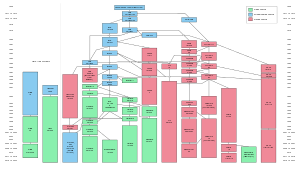Unix

Evolution of Unix and Unix-like systems
|
|
| Developer | Ken Thompson, Dennis Ritchie, Brian Kernighan, Douglas McIlroy, and Joe Ossanna at Bell Labs |
|---|---|
| Written in | C and assembly language |
| OS family | Unix |
| Working state | Current |
| Source model | Historically closed-source, while some Unix projects (including BSD family and Illumos) are open-source |
| Initial release | Development started in 1969 First manual published internally in November 1971 Announced outside Bell Labs in October 1973 |
| Available in | English |
| Kernel type | Monolithic |
| Default user interface | Command-line interface and Graphical (X Window System) |
| License | Varies; some versions are proprietary, others are free/open-source software |
| Official website | unix |
Unix (/ˈjuː.nɪks/; trademarked as UNIX) is a family of multitasking, multiuser computer operating systems that derive from the original AT&T Unix, developed starting in the 1970s at the Bell Labs research center by Ken Thompson, Dennis Ritchie, and others.
Initially intended for use inside the Bell System, AT&T licensed Unix to outside parties from the late 1970s, leading to a variety of both academic and commercial variants of Unix from vendors such as the University of California, Berkeley (BSD), Microsoft (Xenix), IBM (AIX) and Sun Microsystems (Solaris). AT&T finally sold its rights in Unix to Novell in the early 1990s, which then sold its Unix business to the Santa Cruz Operation (SCO) in 1995, but the UNIX trademark passed to the industry standards consortium The Open Group, which allows the use of the mark for certified operating systems compliant with the Single UNIX Specification (SUS). Among these is Apple's macOS, which is the Unix version with the largest installed base as of 2014.
...
Wikipedia
